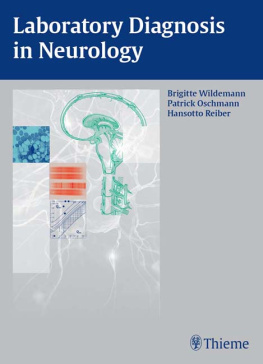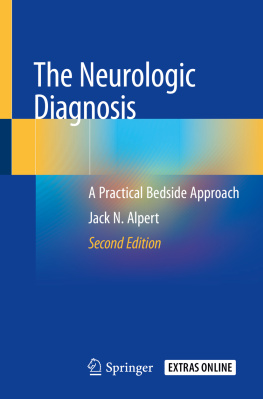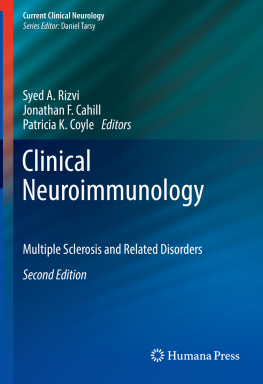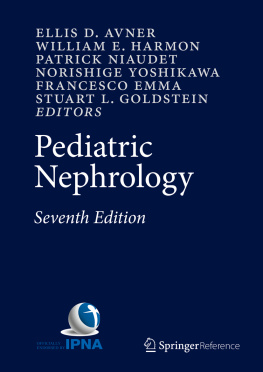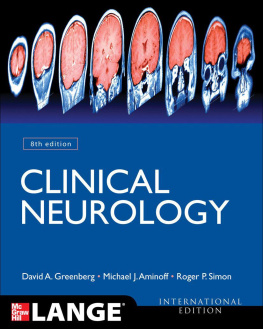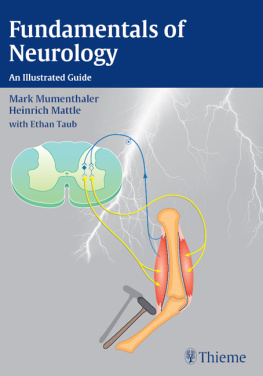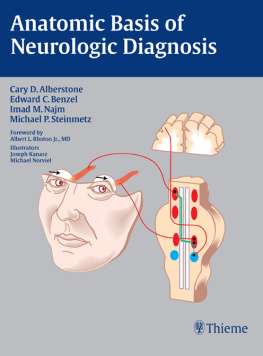
Library of Congress Cataloging-in-Publication Data is available from the publisher.
This book is an authorized translation of the German edition published and copyrighted 2006 by Georg Thieme Verlag, Stuttgart, Germany. Title of the German edition: Neurologische Labordiagnostik.
Translator: Ursula Vielkind, PhD, CTran, Dundas, Canada
Illustrator: Grafik Design Roland Geyer, Weilerswist, Germany
2010 Georg Thieme Verlag,
Rdigerstrasse 14, 70469 Stuttgart, Germany
http://www.thieme.de
Thieme New York, 333 Seventh Avenue,
New York, NY 10001, USA
http://www.thieme.com
Cover design: Thieme Publishing Group
Typesetting by primustype R. Hurler GmbH, Notzingen, Germany
Printed in India by Gopsons Paper Ltd, Delhi
ISBN 978-3-13-144101-0 123456
Important note: Medicine is an ever-changing science undergoing continual development. Research and clinical experience are continually expanding our knowledge, in particular our knowledge of proper treatment and drug therapy. Insofar as this book mentions any dosage or application, readers may rest assured that the authors, editors, and publishers have made every effort to ensure that such references are in accordance with the state of knowledge at the time of production of the book.
Nevertheless, this does not involve, imply, or express any guarantee or responsibility on the part of the publishers in respect to any dosage instructions and forms of applications stated in the book. Every user is requested to examine carefully the manufacturers leaflets accompanying each drug and to check, if necessary in consultation with a physician or specialist, whether the dosage schedules mentioned therein or the contraindications stated by the manufacturers differ from the statements made in the present book. Such examination is particularly important with drugs that are either rarely used or have been newly released on the market. Every dosage schedule or every form of application used is entirely at the user's own risk and responsibility. The authors and publishers request every user to report to the publishers any discrepancies or inaccuracies noticed. If errors in this work are found after publication, errata will be posted at www.thieme.com on the product description page.
Some of the product names, patents, and registered designs referred to in this book are in fact registered trademarks or proprietary names even though specific reference to this fact is not always made in the text. Therefore, the appearance of a name without designation as proprietary is not to be construed as a representation by the publisher that it is in the public domain.
This book, including all parts thereof, is legally protected by copyright. Any use, exploitation, or commercialization outside the narrow limits set by copyright legislation, without the publisher's consent, is illegal and liable to prosecution. This applies in particular to photostat reproduction, copying, mimeographing, preparation of microfilms, and electronic data processing and storage.
Preface by the Editors of this Volume
Laboratory Diagnosis in Neurology gives a practice-oriented overview of the diagnostic relevance of current laboratory tests for neurological diseases and syndromes. The book is intended to provide clinicians and laboratory medical staff with information about the basics of analytical laboratory procedures, the range of indications, and the interpretation of laboratory findings. Also covered are important factors that may interfere with tests.
The book has been designed to supplement other books on laboratory diagnosis (see references in this book) as well as textbooks of neurology. In addition to cerebrospinal fluid analysis, which is of central importance to neurology as a medical specialty, the book also describes laboratory parameters that have relevance for neurological diagnosis in general. The book was written by clinical chemists and neurochemists together with neurologists and psychiatrists with experience in laboratory analysis.
The first part of the book explains the basic methods of cerebrospinal fluid analysis and of laboratory analysis in general. This overview of relevant methodological principles is unique and gives the physician important information about the classification of equipment and procedures, and about how to recognize differences in the qualities of similar methods that are of relevance for the interpretation of their results.
The second part describes the relative importance and diagnostic validity of laboratory findings for specific clinical disorders. The practice-oriented structure of the laboratory integrated cerebrospinal fluid diagnostic report, which collects the individual data of the medical report and presents them in the form of disease-related patterns, appears at the end, together with a tabulation of the most important reference values.
Our thanks are due to the late Prof. Klaus Felgenhauer for suggesting and supporting the writing of this book, and to all the authors and coauthors for their enthusiastic work on individual chapters. We thank Ms. Ursula Vielkind for the professional translation of the book and Mr. Martin Kortenhaus for substantial editing. We also thank the team at Thieme, particularly Ms. Gabriele Kuhn-Giovannini and Mr. Andreas Schabert for excellent collaboration and their helpful and constructive efforts regarding the design and printing of this book.
We would greatly appreciate critical comments from our readers.
Brigitte Wildemann
Patrick Oschmann
Hansotto Reiber
Contributors
Johannes Brettschneider, MD
Department of Neurology
University Hospital Ulm, Germany
Friedrich Ebinger, MD
Department of Child Neurology
University Pediatric Hospital
Heidelberg, Germany
Thomas Gasser, MD
Professor
Department of Neurodegenerative Diseases
Hertie Institute for Clinical Brain Research
University Hospital Tbingen, Germany
Heinrich Konrad Geiss, MD
Professor
Rhoen Clinic
Bad Neustadt/Saale, Germany
Patrick Oschmann, MD
Professor
Department of Neurology
Bayreuth Hospital, Germany
Markus Otto, MD
Professor
Department of Neurology
University Hospital Ulm, Germany
Hansotto Reiber, PhD
Professor
CSF and Complexity Studies
University Hospital Gttingen, Germany
Invited Professor
Instituto Superior de Ciencias Medicas de La Habana, Cuba
Angela Rosenbohm, MD
Department of Psychiatry
University Hospital Ulm, Germany
Erich Schmutzhard, MD
Professor
Department of Neurology
University of Innsbruck, Austria
Paul Schnitzler, PhD
Department of Virology
Hygiene Institute
University Hospital Heidelberg, Germany
Anne-Dorte Sperfeld, MD
Helios Clinic
Bad Saarow, Germany
Erwin Stolz, MD
Professor
Department of Neurology
University Hospital Giessen, Germany
Brigitte Storch-Hagenlocher, MD
Department of Neurology
University Hospital Heidelberg, Germany
Hayrettin Tumani, MD
Professor
Department of Neurology
University Hospital Ulm, Germany
Manfred Uhr, MD, PhD
Max Planck Institute for Psychiatry
Munich, Germany
Marlies Vogt-Schaden, MD
Department of Neurooncology
University Hospital Heidelberg, Germany
Brigitte Wildemann, MD
Professor
Division of Molecular Neuroimmunology
Department of Neurology
University Hospital Heidelberg, Germany
Ulrich Wurster, PhD
CSF Laboratory, Department of Neurology
Medical School of Hanover, Germany
Markus Zorn, MSc
Central Laboratory
Next page
